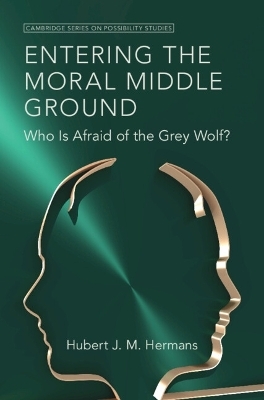
Entering the Moral Middle Ground
Who Is Afraid of the Grey Wolf?
Seiten
2024
Cambridge University Press (Verlag)
978-1-009-43200-9 (ISBN)
Cambridge University Press (Verlag)
978-1-009-43200-9 (ISBN)
Contemporary society needs the recognition of a moral middle ground, where human behavior can be evaluated as permissible, understandable, or even valuable. As a counterforce to polarization and divisive politics, an identity model is proposed in which individual and group identities are transcended by a human and ecological identity.
Many social and political groups consider each other as enemies rather than opponents with whom one can openly disagree. By introducing the concept of a moral middle ground, this book aims to overcome the perceived separation between good and bad, highlighting the possibility that human actions are permissible, understandable, and even valuable. To elucidate the nature of the moral middle ground and its psychological potentials, the author uses his theoretical framework, Dialogical Self Theory (DST). On the basis of these ideas, he portrays a variety of phenomena, including healthy selfishness, black humor, white lies, hypocrisy and the world views of some historical figures. He then demonstrates how the moral middle ground contributes to the development of a human and ecological identity. As a result, students and researchers in various disciplines, including psychology, literary studies, moral philosophy, political science, history, sociology, theology and cultural anthropology, will benefit from this book.
Many social and political groups consider each other as enemies rather than opponents with whom one can openly disagree. By introducing the concept of a moral middle ground, this book aims to overcome the perceived separation between good and bad, highlighting the possibility that human actions are permissible, understandable, and even valuable. To elucidate the nature of the moral middle ground and its psychological potentials, the author uses his theoretical framework, Dialogical Self Theory (DST). On the basis of these ideas, he portrays a variety of phenomena, including healthy selfishness, black humor, white lies, hypocrisy and the world views of some historical figures. He then demonstrates how the moral middle ground contributes to the development of a human and ecological identity. As a result, students and researchers in various disciplines, including psychology, literary studies, moral philosophy, political science, history, sociology, theology and cultural anthropology, will benefit from this book.
Hubert J. M. Hermans is Emeritus Professor at Radboud University, the Netherlands. He is internationally recognized as the founder of Dialogical Self Theory (DST). He is also the Honorary President of the International Society for Dialogical Science and he was decorated as Knight in the Order of the Netherlands Lion for exceptional scientific achievements.
Introduction; 1. Dialogical Self Theory and the process of positioning; 2. Embracing bad as good via internalization; 3. Rejecting bad via externalization; 4. The vitality of the moral middle ground; 5. Contradiction as intrinsic to the multiplicity of the self; 6. Multi-level identity and the moral middle ground: toward a human and ecological identity.
| Erscheinungsdatum | 16.03.2024 |
|---|---|
| Reihe/Serie | Cambridge Series on Possibility Studies |
| Zusatzinfo | Worked examples or Exercises |
| Verlagsort | Cambridge |
| Sprache | englisch |
| Gewicht | 608 g |
| Themenwelt | Geisteswissenschaften ► Psychologie ► Entwicklungspsychologie |
| Geisteswissenschaften ► Psychologie ► Sozialpsychologie | |
| Sozialwissenschaften ► Soziologie | |
| ISBN-10 | 1-009-43200-1 / 1009432001 |
| ISBN-13 | 978-1-009-43200-9 / 9781009432009 |
| Zustand | Neuware |
| Informationen gemäß Produktsicherheitsverordnung (GPSR) | |
| Haben Sie eine Frage zum Produkt? |
Mehr entdecken
aus dem Bereich
aus dem Bereich
Vormals Oerter & Montada
Buch | Hardcover (2018)
Julius Beltz GmbH & Co. KG (Verlag)
64,00 €
Grundlagen, Diagnostik und Therapie vom Säuglingsalter bis zum alten …
Buch | Hardcover (2022)
Klett-Cotta (Verlag)
45,00 €
Buch | Hardcover (2022)
Klett-Cotta (Verlag)
55,00 €


